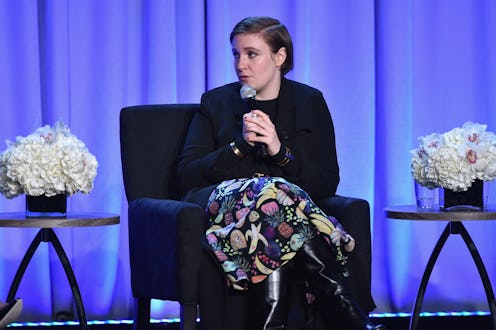Entertainment
Lena Dunham Takes A Stand Against Photoshop
Sometimes, while crusading against societal pressures and norms, you just need to take some time to fight for yourself. One woman who is doing just this is Lena Dunham, who is taking a stand against photoshop, as she explained in the March 8 edition of Lenny Letter. But she isn't doing this in the name of you or me or to make a grand statement that exists outside of her. No, it's for Dunham herself. While the actor/writer/director has spoken out on the issue of body image and body positivity in the past, and in some instances, used her body as the vehicle to do so, this particular instance is much more personal. But, rest assured, it is just as inspiring.
Dunham is not immune to the seductive nature of social media. In her Lenny Letter essay, she explains that while surfing through Instagram:
One picture caught my eye: an iPhone photo of a Spanish magazine, its headline unreadable to me, though I did see a word resembling feminist. On the front of the issue was me, eyes wide and kohl-lined, doing my best Twiggy impression.
Which is actually nothing too scandalous, right? Well, not exactly. Because as innocent as that may sound, it's indicative of a much broader issue. One that Dunham says Zendaya, Kate Winslet, and Jamie Lee Curtis for called out before she ever did.
The Girls star goes on to explain:
I was assisted in this impression not just by a pixie cut and a chic white jumper but also by what was clearly — to me — some skillful Photoshop. My chin was strong and defined, practically another continent from my neck, and my legs and arms were lean and milky white instead of their usual mottled pink. I’m not sure what it was about this particular image that set me off. It’s three years old, is licensed often, and was taken by a photographer I love. But I felt a need so immediate it was like demanding that a driver pull over so I could go to the bathroom despite being in the middle of a five-lane highway... I wanted to tell people, loudly: “That’s not my body!”
And coming to the realization that she had been continually marketed as someone she is not, completely unsettled her.
Despite being assured her that her body wasn't photoshopped, she believes that the picture was altered "somewhere between raw digital file and Spanish glory." But that was almost a non-issue for her, because as she says, she "didn’t have any interest in shaming or blaming anyone in the process." Dunham expressed that the "real issue" here is that "I don’t recognize my own f*cking body anymore. And that’s a problem."
She opened up about how she knows her pictures in other magazines are photoshopped regularly and how she has just learned to accept it. In fact, she even explains that she wasn't exactly against some of the photoshopping, either. To which I say, hey, we're all human. I use that Instagram lighting tool to my advantage more than I care to admit. In fact, I'm fairly certain even my high school senior portrait was cleared of "imperfections." But while an occasional "improvement" to an Instagram selfie is one thing, having your image altered over and over again is another thing entirely. You lose your sense of self.
Dunham explained,
Something snapped when I saw that Spanish cover. Maybe it was the feeling of barely recognizing myself and then being told it was 100 percent me but knowing it probably wasn’t and studying the picture closely for clues. Maybe it was realizing that was an image I had at some point seen, approved, and most likely loved. Maybe it was the fact that I no longer understand what my own thighs look like. But I knew that I was done.
She cheekily notes that she is a "ham" and that being "done" doesn't mean not doing photo shoots any longer; it means that she wants to "pick her own thigh out of a lineup:"
Done with allowing images that retouch and reconfigure my face and body to be released into the world. The gap between what I believe and what I allow to be done to my image has to close now. If that means no more fashion-magazine covers, so be it. I respect the people who create those magazines and the job they have to do. I thank them for letting me make a few appearances and for making me feel gorgeous along the way. But I bid farewell to an era when my body was fair game.
Perhaps this particular battle that Dunham chose to fight was self-centered, but that doesn't mean it's selfish. Her feelings and grievances as an individual matter. Dunham's chutzpah to own her body as is, perhaps to her own professional detriment, sets a greater movement in motion. Through this self-reflection, she has helped progress a greater cause. Her standing with and supporting other actors who have taken this stand before her, shows that this trend of exposing and refusing photoshop is snowballing, and that there's a possibility for real change.
Image: Giphy
